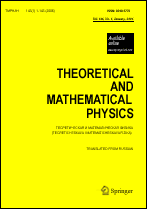|
|
Teoreticheskaya i Matematicheskaya Fizika, 1978, Volume 37, Number 3, Pages 336–346
(Mi tmf3124)
|
 |
|
 |
This article is cited in 5 scientific papers (total in 5 papers)
Hamiltonian algebras
G. K. Tolokonnikov
Abstract:
Suppose we are given a Lie algebra of functions of a finite number of variables of the
form $[A(x),B(x)]=\int\widetilde A(k)\widetilde B(p)\exp\{i(k+p)x\}\alpha(k\vert p)dkdp$, where $\widetilde A$ and $\widetilde B$ are the Fourier transforms of $A$ and $B$. Then the function $\alpha$ satisfies the functional equations $\alpha(k_1\vert k_2)\alpha(k_1+k_2\vert k_3)+\alpha(k_2\vert k_3)\alpha(k_2+k_3\vert k_1)+\alpha(k_3\vert k_1)\alpha(k_3+k_1\vert k_2)=0$, $\alpha(k\vert p)=-\alpha(p\vert k)$. All solutions of these equations are found under the assumption that $\frac{\partial^{n}\alpha}{\partial x^n}
(x\vert 0)\not\equiv 0$ for some $n$ is $\alpha-n$ times continuously differentiable in some neighborhood of the origin. The obtained solutions give all Lie algebras of this form, in particular all algebras of polynomials. All nearly canonical Hamiltonian algebras [1] are found.
Received: 01.12.1977
Citation:
G. K. Tolokonnikov, “Hamiltonian algebras”, TMF, 37:3 (1978), 336–346; Theoret. and Math. Phys., 37:3 (1978), 1057–1065
Linking options:
https://www.mathnet.ru/eng/tmf3124 https://www.mathnet.ru/eng/tmf/v37/i3/p336
|


|




 Contact us:
Contact us: Terms of Use
Terms of Use
 Registration to the website
Registration to the website Logotypes
Logotypes








 Citation in format
Citation in format 
